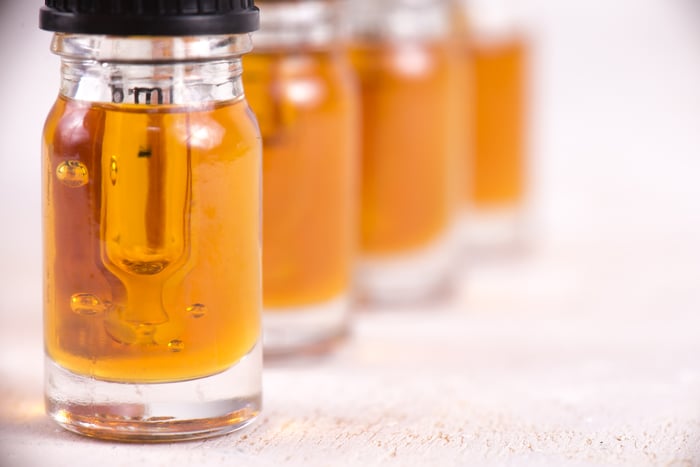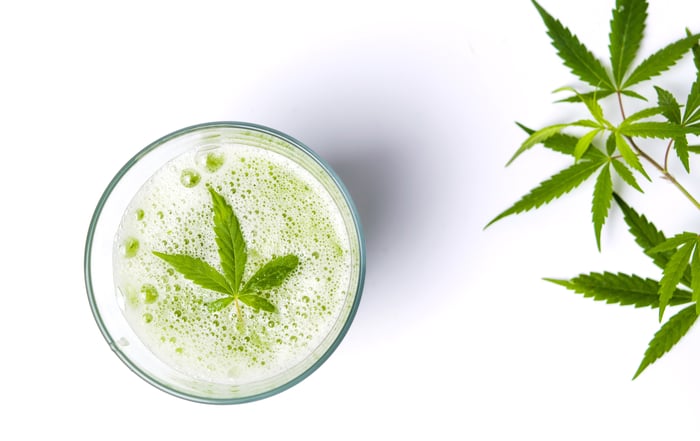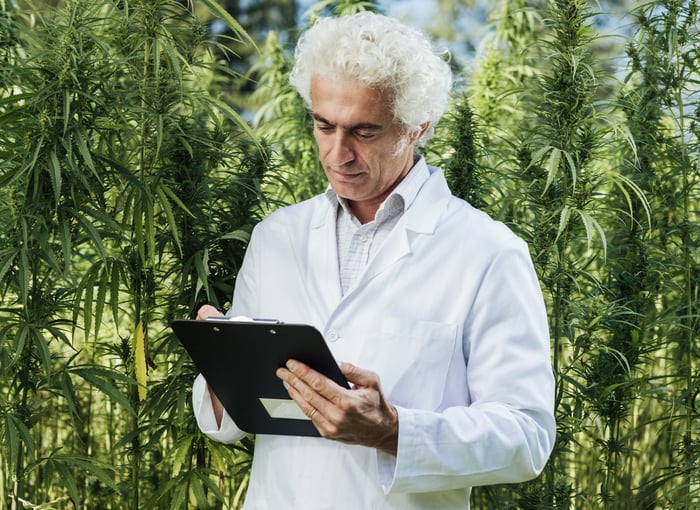When it comes to the fastest-growing industries on the planet, you'd have a tough time topping the legal cannabis industry. Global sales are expected to increase by 38% in 2019, but potentially quadruple by the time 2030 rolls around. With direct and ancillary companies taking part in this growth, it's pretty easy to see why marijuana stocks left the broader market eating their dust in the first quarter.
But within the cannabis realm are a number of niches and subcategories that offer varying degrees of intrigue to investors. Perhaps no particular subcategory of the marijuana movement is more popular right now than cannabidiol (CBD). Before you decide to invest in pot stocks, it's important that you have the 411 on CBD. Here are nine things you should know.

Image source: Getty Images.
1. CBD has an audience distinct from that of THC
CBD is one of more than 110 different cannabinoids that have been isolated by researchers. But when we're talking about popularity, it's pretty much a two-horse race between tetrahydrocannabinol (THC) and CBD.
THC is the psychoactive cannabinoid that gets a user high, and it'll more often than not be targeted at recreational consumers. Meanwhile, CBD is a nonpsychoactive cannabinoid best known for its perceived medical benefits. This means CBD is going to be targeted at the medical community and casual users who don't want to get high.
2. Its legality is tricky
A question that often arises is whether or not CBD is legal. To answer this, we really need to know the source from which CBD is derived. At the federal level, cannabis, and all extracts of the cannabis plant, is considered illegal. Although CBD derived from the cannabis plant is likely to be legal in the 33 states to have passed medical marijuana laws, interstate transport of cannabis-derived CBD products is against the law.
However, when President Trump signed the new farm bill into law in December 2018, hemp and hemp-derived products (in many forms) became legal in all 50 states. The hemp plant typically has very low concentrations of THC, but tends to be rich with CBD, making it perfect for CBD extraction.

Image source: Getty Images.
3. It's not allowed in food, beverages, or dietary supplements
Notice in the previous point how I said hemp-derived CBD is legal "in many forms," as opposed to all forms? That's because adding CBD, regardless of its extraction source, to food, beverages, and dietary supplements, is a big no-no, according to the U.S. Food and Drug Administration (FDA). Even though the FDA is planning to review CBD's use as a supplement in food and beverage next month via public hearing, it regards it as a substance with unknown side effects and benefits as of now.
4. New production techniques are worth closely monitoring
This is a good place to mention that while a majority of CBD is produced from traditional extraction techniques that use solvents, hydrocarbon gases, distillation, and heat, new techniques are being developed that are worth keeping an eye on.
Most notably, Cronos Group (CRON 1.23%) announced an up-to-$100 million partnership with Ginkgo Bioworks in September that'll allow the company to use Ginkgo's microorganism platform. The platform can yield yeast strains that are capable of producing low-cost cannabinoids at commercial scale. Interestingly, Cronos and Ginkgo are able to use these yeast strains to pinpoint what cannabinoids they want to produce, meaning previously rare cannabinoids can now be manufactured in greater quantities. Cronos is counting on this partnership to really ramp up its growth prospects.
5. It's a huge market opportunity
According to the Brightfield Group, global CBD sales are expected to soar from $591 million in 2018 to approximately $22 billion by 2022. That's a compound annual growth rate of 147%, for those of you keeping score at home. While it remains to be seen if CBD products can actually hit this lofty goal, there's no doubt that the buzz surrounding CBD is picking up on Wall Street.

Image source: Getty Images.
6. High margins are incredibly attractive
It should be noted that it's not just the sales growth potential of CBD products that's attractive. Also enticing are the margins.
With what few examples we have of recreationally legal markets in the U.S., oversupply and commoditization of dried cannabis flower are likely. This means growers have to be diligent about diversifying their product lines in order to avoid margin deterioration. So most growers throughout North America have turned their attention to oils, or more specifically CBD oils.
Products containing CBD (including oil, topicals, vapes, beverages, and capsules) typically have higher price points than traditional dried flower, and consumers are often willing to pay that higher price point. There's little in the way of oversupply worries for extracts like CBD, which should preserve healthy margins.
7. CBD has only one proven indication
Another common question surrounding CBD is what ailments it actually treats. The official answer, according to the FDA, is that CBD has no recognized medical benefits, save for one indication.
Last June, GW Pharmaceuticals' (GWPH) CBD-based oral drug Epidiolex became the first cannabis-derived therapy to be approved by the FDA as a treatment for two rare types of childhood-onset epilepsy (Lennox-Gastaut syndrome and Dravet syndrome). In multiple late-stage trials, GW Pharmaceuticals' lead drug reduced seizure frequency from baseline by between 30% and 40%. GW Pharmaceuticals launched Epidiolex, which received the most lenient scheduling possible from the U.S. Drug Enforcement Agency (Schedule V), in early November with an average annual list price of $32,500.
Every other indication -- pain or pain management, glaucoma, anxiety, and so on -- isn't recognized by the FDA as an ailment that CBD can treat.

Image source: Getty Images.
8. FDA crackdowns are still possible
The passage of the farm bill has certainly opened doors for hemp-derived CBD products. However, it hasn't dampened the spirit of the FDA, which has threatened to curb overzealous claims by CBD manufacturers of what it's capable of treating.
In one of the more notable developments of late, both Walgreens Boots Alliance (WBA 0.37%) and CVS Health (CVS 0.62%) announced that they'd begin carrying hemp-derived topicals in their stores. CVS Health announced the move first for roughly 800 stores in eight states, with Walgreens Boots Alliance following just days later by announcing the addition of CBD topicals to approximately 1,500 stores.
But outgoing FDA Commissioner Scott Gottlieb expressed concern over Walgreens' and CVS' moves to carry CBD products while speaking at a House Appropriations Committee hearing last week. This suggests that the FDA won't hold back if it doesn't agree with how CBD products are being marketed or advertised.
9. Charlotte's Web is a name to know
Lastly, you won't find too many CBD pure-play stocks, but the one you'll want to know (since it's the largest hemp-derived CBD manufacturer by market share) is Charlotte's Web Holdings (CWBHF 1.27%).
Prior to the passage of the farm bill, Charlotte's Web had its CBD products in 3,680 retailers across the country. But with hemp-derived CBD now legal in all states, it's expected to have an easier path to new retail doors.
Furthermore, Charlotte's Web is one of a very small number of pot stocks that have actually been profitable on an operating basis (i.e., without a number of one-time benefits and fair-value adjustments boosting results). The company has been generating high-margin sales with reasonably low costs for two years, and investors would struggle to find a more consistently profitable pot stock.
If you're looking to dive headfirst into the CBD craze, then Charlotte's Web is a great place to begin your research.





